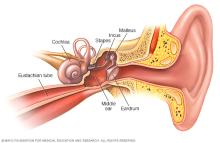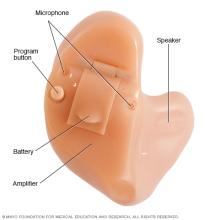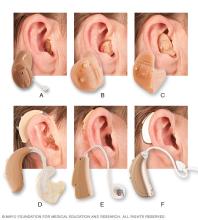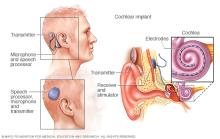Hearing loss
Conditions
Overview
Hearing loss that comes on little by little as you age, also known as presbycusis, is common. More than half the people in the United States older than age 75 have some age-related hearing loss.
There are three types of hearing loss:
- Conductive, which involves the outer or middle ear.
- Sensorineural, which involves the inner ear.
- Mixed, which is a mix of the two.
Aging and being around loud noises both can cause hearing loss. Other factors, such as too much earwax, can lower how well ears work for a time.
You usually can't get hearing back. But there are ways to improve what you hear.
Symptoms
Symptoms of hearing loss may include:
- Muffling of speech and other sounds.
- Trouble understanding words, especially when in a crowd or a noisy place.
- Trouble hearing the letters of the alphabet that aren't vowels.
- Often asking others to speak more slowly, clearly and loudly.
- Needing to turn up the volume of the television or radio.
- Staying clear of some social settings.
- Being bothered by background noise.
- Ringing in the ears, known as tinnitus.
When to see a doctor
If you have a sudden loss of hearing, particularly in one ear, seek medical attention right away.
Talk to your health care provider if loss of hearing is causing you trouble. Age-related hearing loss happens little by little. So you may not notice it at first.
Causes

To understand how hearing loss happens, it can be helpful to understand how hearing works.
How you hear
The ear has three main parts: the outer ear, middle ear and inner ear. Sound waves pass through the outer ear and cause the eardrum to vibrate. The eardrum and three small bones of the middle ear make the vibrations bigger as they travel to the inner ear. There, the vibrations pass through fluid in a snail-shaped part of the inner ear, known as the cochlea.
Attached to nerve cells in the cochlea are thousands of tiny hairs that help turn sound vibrations into electrical signals. The electrical signals are transmitted to the brain. The brain turns these signals into sound.
How hearing loss can occur
Causes of hearing loss include:
-
Damage to the inner ear. Aging and loud noise can cause wear and tear on the hairs or nerve cells in the cochlea that send sound signals to the brain. Damaged or missing hairs or nerve cells don't send electrical signals well. This causes hearing loss.
Higher pitched tones may seem muffled. It may be hard to pick out words against background noise.
- Buildup of earwax. Over time, earwax can block the ear canal and keep sound waves from passing through. Earwax removal can help restore hearing.
- Ear infection or unusual bone growths or tumors. In the outer or middle ear, any of these can cause hearing loss.
- Ruptured eardrum, also known as tympanic membrane perforation. Loud blasts of noise, sudden changes in pressure, poking an eardrum with an object and infection can cause the eardrum to burst.
Risk factors
Factors that damage or lead to loss of the hairs and nerve cells in the inner ear include:
- Aging. The inner ear breaks down over time.
- Loud noise. Being around loud sounds can damage the cells of the inner ear. Damage can happen by being around loud noises over time. Or the damage can come from a short blast of noise, such as from a gunshot.
- Heredity. Your genes may make you more likely to have ear damage from sound or from aging.
- Noises on the job. Jobs where loud noise is constant, such as farming, construction or factory work, can lead to damage inside the ear.
- Noises at play. Exposure to explosive noises, such as from firearms and jet engines, can cause immediate, permanent hearing loss. Other activities with dangerously high noise levels include snowmobiling, motorcycling, carpentry or listening to loud music.
- Some medicines. These include the antibiotic gentamicin, sildenafil (Viagra) and certain medicines used to treat cancer, which can damage the inner ear. Very high doses of aspirin, other pain relievers, antimalarial drugs or loop diuretics can cause short-term effects on hearing. These include ringing in the ears, also known as tinnitus, or hearing loss.
- Some illnesses. Illnesses such as meningitis that cause high fever can harm the cochlea.
Comparing loudness of common sounds
The chart below lists common sounds and their decibel levels. A decibel is a unit used to measure how loud sound is. The Centers for Disease Control and Prevention says noise above 70 decibels over time can start to damage hearing. The louder the noise, the less time it takes to cause lasting hearing damage.
| Sound levels of common noises | |
|---|---|
| Decibels | Noise source |
| Safe range | |
| 30 | Whisper |
| 40 | Refrigerator |
| 60 | Normal conversation |
| 75 | Dishwasher |
| Risk range | |
| 85 | Heavy city traffic, school cafeteria |
| 95 | Motorcycle |
| 100 | Snowmobile |
| 110 | Chain saw |
| 110 | Jackhammer, rock concert, symphony |
| 115 | Sandblasting |
| 120 | Ambulance siren, thunder |
| 140-165 | Firecracker, firearms |
Longest amount of time to be around loud sounds
Below are the loudest noise levels people can be around on a job without hearing protection and for how long.
| Maximum job-noise exposure allowed by law | |
|---|---|
| Sound level, decibels | Duration, daily |
| Based on The National Institute for Occupational Safety and Health (NIOSH), 2018. | |
| 90 | 8 hours |
| 92 | 6 hours |
| 95 | 4 hours |
| 97 | 3 hours |
| 100 | 2 hours |
| 102 | 1.5 hours |
| 105 | 1 hour |
| 110 | 30 minutes |
| 115 | 15 minutes or less |
Complications
Hearing loss can make life less pleasant. Older adults with hearing loss often report being depressed. Because hearing loss can make it harder to talk with others, some people with hearing loss feel cut off from others. Hearing loss is also linked to loss of thinking skills, known as cognitive impairment.
Hearing loss also is linked to risk of falling.
Prevention
The following steps can help prevent hearing loss from loud noises and keep hearing loss from aging from getting worse:
- Protect your ears. Staying away from loud noise is the best protection. In the workplace, plastic earplugs or glycerin-filled earmuffs can help protect hearing.
- Have your hearing tested. If you work around a lot of noise, think about regular hearing tests. If you've lost some hearing, you can take steps to prevent further loss.
- Avoid risks from hobbies and play. Riding a snowmobile or a jet ski, hunting, using power tools, or listening to rock concerts can damage hearing over time. Wearing hearing protectors or taking breaks from the noise can protect your ears. Turning down the volume when listening to music helps too.
Diagnosis
Tests to diagnose hearing loss may include:
- Physical exam. A health care provider looks in your ear for possible causes of your hearing loss, such as earwax or an infection. The way your ear is formed might cause hearing problems, as well.
- Screening tests. A whisper test, which involves covering one ear at a time while listening to words spoken at many volumes, can show how you react to other sounds.
- App-based hearing tests. You can use a mobile app on your tablet to screen yourself for hearing loss.
- Tuning fork tests. Tuning forks are two-pronged, metal instruments that make sounds when hit. Simple tests with tuning forks can help find hearing loss. They may also show where the ear damage is.
- Audiometer tests. A specialist in hearing loss, known as an audiologist, does these more-thorough tests. Sounds and words are directed through earphones to each ear. Each tone is repeated at low levels to find the quietest sound you can hear.
Treatment



You can get help for hearing problems. Treatment depends on the cause of the hearing loss and how bad it is.
Options include:
- Removing earwax. Earwax blockage is a cause of hearing loss that can be fixed. A health care provider might remove earwax using suction or a small tool with a loop on the end.
- Surgery. Some types of hearing loss can be treated with surgery. For repeated infections that cause fluid in the ear, a care provider might put in small tubes that help ears drain.
- Hearing aids. If hearing loss is from damage to the inner ear, a hearing aid can be helpful. A hearing specialist, known as an audiologist, can talk about how hearing aids can help and what kinds there are. Audiologists also can fit you with a hearing aid.
-
Cochlear implants. When a regular hearing aid isn't likely to help much, a cochlear implant might be an option. A cochlear implant isn't like a hearing aid that makes sound stronger and directs it into the ear canal. Instead, a cochlear implant goes around the parts of the inner ear that don't work to spur the hearing nerve.
An audiologist and a health care provider trained in the ears, nose and throat (ENT) can tell you the risks and benefits.
Coping and support
These tips can help you stay connected with hearing loss:
- Tell your friends and family. Let them know that you've lost some hearing.
- Put yourself in a good position to hear. Face the person you're talking to.
- Turn off background noise. For example, noise from a television can make talking and listening harder.
- Ask others to speak up, but not too loud, and speak clearly. Most people will be helpful if they know you're having trouble hearing them.
- Get the other person's attention before speaking. Don't try to talk to someone in a different room.
- Choose quiet settings. In public, choose a place to talk that's away from noisy areas.
- Consider using a listening aid. Hearing devices can help you hear better while lessening noises around you. These include TV-listening systems or devices that make phone sounds stronger, smartphone or tablet apps, and closed-circuit systems in public places.
Preparing for an appointment
If you think you have hearing loss, call your health care provider. Your provider might refer you to a hearing specialist, also known as an audiologist.
Here's some information to help you get ready for your appointment.
What you can do
- Write down your symptoms and how long you've had them. Is the hearing loss in one ear or both? Ask friends and family to help you make the list. They may know of changes that you don't.
- Write down key medical information, especially related to ear problems. Include any repeated infections, injury to your ear or ear surgery you've had. Also list medicines, vitamins or supplements you take, including doses.
- Describe your work history. Include jobs with high noise levels, even if they're from a long time ago.
- Take a family member or friend along. Someone with you can help you remember all the information you get.
- Write down questions for your health care provider.
For hearing loss, some questions to ask include:
- What's the most likely cause of my symptoms?
- What else might be causing my symptoms?
- What tests do I need?
- Should I stop taking any of my medicines?
- Should I see a specialist?
What to expect from your doctor
Your health care provider might ask you questions, including:
- How would you describe your symptoms? Does either ear hurt? Do they leak fluid?
- Did your symptoms begin all at once?
- Do you have ringing, roaring or hissing in your ears?
- Do you have dizziness or balance problems?
- Do you have a history of ear infections, ear trauma or ear surgery?
- Have you ever worked in a job with loud noise, flown airplanes or been in military combat?
- Does your family complain that you keep the television or radio too loud?
- Do you have trouble hearing people who talk in a low voice?
- Do you have trouble hearing on the telephone?
- Do you often ask others to speak up or repeat themselves? Does this happen more often in a noisy setting, such as a crowded restaurant?
- Can you hear when someone comes up behind you?
- Does your hearing affect your quality of life?
- Would you be willing to try a hearing aid?
© 1998-2026 Mayo Foundation for Medical Education and Research(MFMER). All rights reserved. Terms of Use
